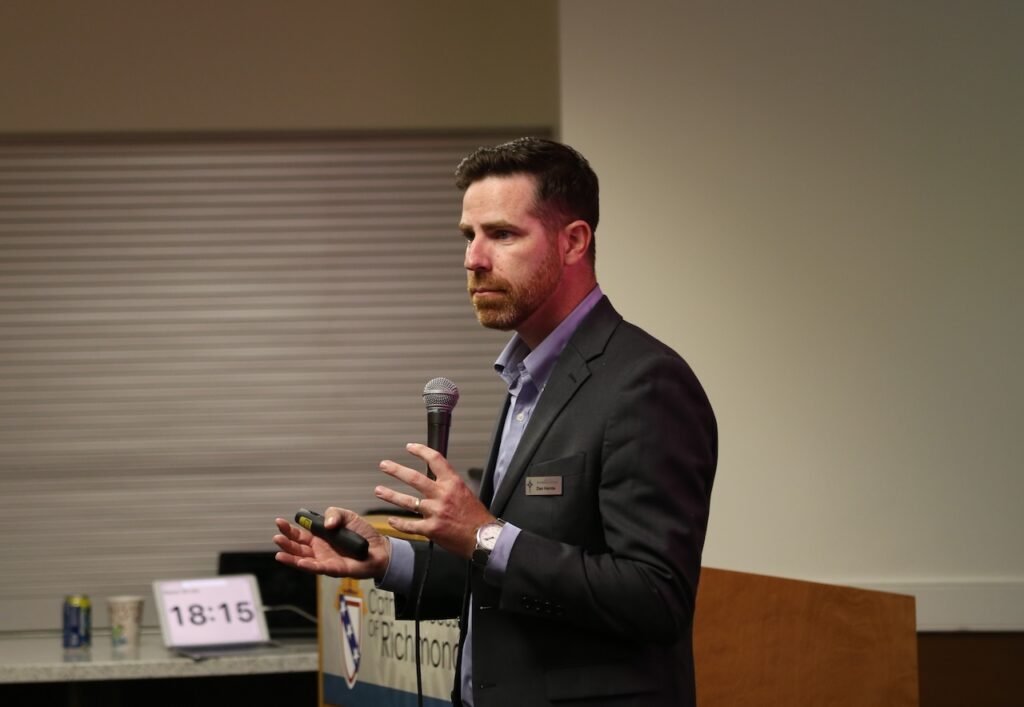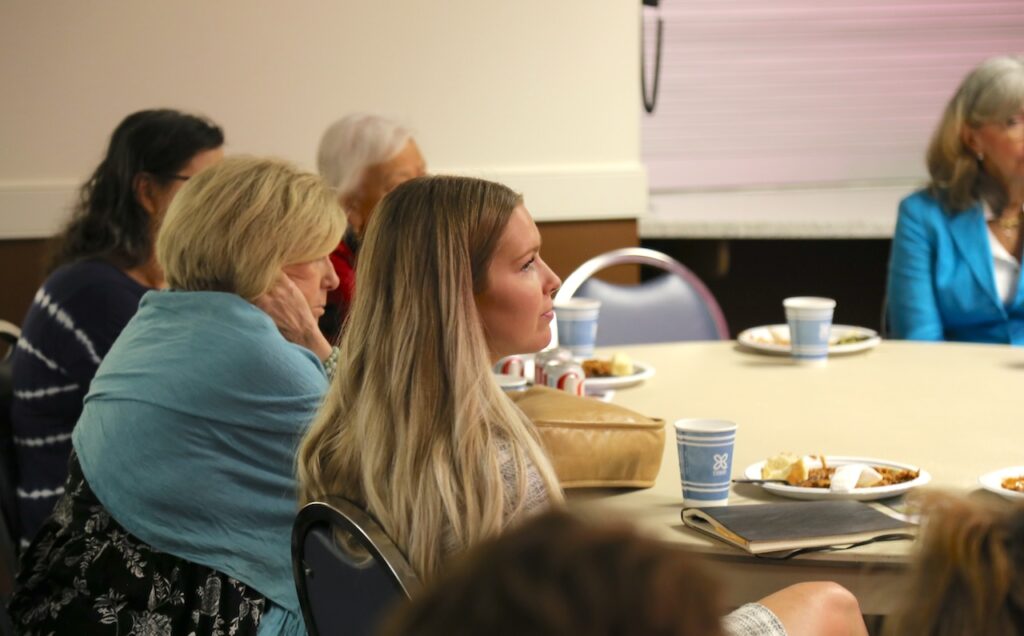When the Virginia General Assembly convenes Jan. 8, 2025, pro-life groups across the state will be ready to confront an amendment designed to enshrine access to abortion in the state constitution.
The National March for Life will take place Jan. 24, 2025; Virginia Pro-Life Day will take place Jan. 29, 2025; and the Virginia March for Life is scheduled for April 2, 2025. But on Sept. 10, at the Pastoral Center in Richmond, several pro-life organizers and volunteers came together for a networking event, demonstrating that they have their work cut out for them year-round.
The fall edition of the 40 Days for Life program – in which volunteers pray for an end to abortion and offer pro-life resources outside of abortion clinics – is already underway. The campaign began Sept. 25 at the Planned Parenthood on North Hamilton Street in Richmond, and will run through Nov. 3.
Berek Dostie, the 40 Days for Life Richmond campaign leader, was the first speaker at the Sept. 10 event.
“Ultimately, we are here for the sanctity of life,” said Dostie. “We need people on the sidewalk, and we need people to just pray silently.”
Dostie offered information on where to park, when to meet, and how to address both abortion clinic workers and those seeking an abortion. At the 40 Days for Life Richmond campaign website, those interested can sign up for a time slot. The goal is to have someone onsite from 7 a.m. to 7 p.m., Monday through Saturday.
“Be nice to the workers and the people who come in. We don’t know who we’re going to be witnessing to that day,” Dostie instructed. “I like to read Scripture out loud – it definitely gets noticed. But we want to be as welcoming as possible.”
Genevive Daniel, a pro-life advocate who spoke after Dostie, gave a personal testimony. In high school, she had volunteered outside of Planned Parenthood herself. But when she unexpectedly got pregnant in her early twenties, she was estranged from her family and from the Church. She went to Planned Parenthood, hoping to find the team she had volunteered with and look for resources, such as a pregnancy center for young women.
“The sidewalk was empty, lifeless,” Daniel recounted. “And I went in [to Planned Parenthood]. And I live with that devastation every day. When I see my children, I think about the brother or sister we lost because of my choice.”
Resources and priorities
Dan Harms, associate director of Marriage, Family and Life in the diocesan Office for Evangelization, talked about the United States Conference of Catholic Bishops (USCCB) initiative, “Walking with Moms in Need.” The goal of the program is to make the Church a resource for moms who are unexpectedly pregnant and do not know where to turn.
“Imagine you’re a 17-year-old girl, or a 22-year-old cashier at a grocery store. Think about your income. What would change if you brought a child into the world? What resources would you need?” said Harms.
“Would you need a car, would you need help with groceries, with gas, would you need a community to help you get off drugs and alcohol? What do you need?” he continued. “There are a million touchpoints that impact whether women choose life or not.”

Moriah Johnson, Virginia coordinator for HerPLAN, was another speaker. HerPLAN stands for Her Pregnancy and Life Assistance Network, and its stated goal is to connect women with medical, social and material resources.
Johnson demonstrated how to navigate the HerPLAN website and directory. She also gave instructions on how to get involved with the program.
“HerPLAN is an easy way to find pregnancy resources,” said Johnson. “If you think your church would be interested in starting a ministry at a more formal level, the Pathways Guide [online] is a guide to serving moms and babies in your community.”
The Virginia Society for Human Life (VSHL) also had a presence at the event. Since 1967, VSHL has lobbied for pro-life causes at the General Assembly.
Louise Hartz, a parishioner at St. Bridget, Richmond, has been involved with VSHL since its inception in 1967 and served as president from 1995-2001. Hartz did not speak at the event, but she and other VSHL representatives listened as Harms reviewed legislative priorities for the upcoming session.
“The number one thing on most people’s minds is that we are facing a state constitutional amendment guaranteeing a right to terminate a pregnancy without consequence,” said Harms. “Our pro-choice brothers and sisters are going to ask for the most aggressive thing they can ask for.”
Harms outlined a strategic response, which included securing a pro-life majority in either the House of Delegates or the Senate, working to change the hearts of pro-abortion legislators, and strengthening the culture of life in Virginia.
Accomplishments and hope
Hartz noted a number of legislative achievements VSHL has contributed to in the past, including the 1998 partial-birth abortion ban, and the defeat of legislation during the 2024 session that would have legalized assisted suicide in the state.
“Even if a legislator isn’t on our side, it’s important that the information gets to his desk. You never know who the assistant is, who reads something and hasn’t thought about it like that,” said Hartz. “There might be somebody in the staff that might say, ‘Did you think about it this way?’ You never know what might tick in somebody’s brain.”
For example, said Hartz, a personal relationship with Democratic State Senator Louise Lucas turned into a vote for the partial-birth abortion ban in 1998. And there is some degree of bipartisan support for assisted suicide prevention, which is not just a pro-life issue, but a disabilities rights issue.
“We’ve got staying power,” said Hartz. “We’re going to be there, always there supporting the life of the unborn and the elderly – the people who are most vulnerable.”
“Sometimes you don’t even have to say anything,” she added. “If they see you in the crowd, they know you’re there.”
In 2025, other legislative priorities include medical protections for infants born alive after an attempted abortion, support for pregnancy resource centers, and support for childcare services.
Last year, Democrats introduced a bill that would remove sales tax on baby products, and Republicans introduced a $4,000 tax credit for non-family adoptions. Both pieces of legislation died in finance.
“Brothers and sisters, go to your legislators and tell them, ‘Find out how to fund it,’” said Harms. “So, you proposed a great bill, but you couldn’t figure out how to fund it.”
He also encouraged activists to work with those on the other side of the issues, if possible.
“Seek common ground, good will, and charity,” said Harms. “Maybe, just maybe, we can get to a place where we don’t get an extreme amendment passed, that allows us to save hundreds, thousands, millions of children.”

